- Home
- Keith R. A. DeCandido
The Brave And The Bold Book One
The Brave And The Bold Book One Read online
This book is a work of fiction. Names, characters, places and incidents are products of the author’s imagination or are used fictitiously. Any resemblance to actual events or locales or persons, living or dead, is entirely coincidental.
An Original Publication of POCKET BOOKS
POCKET BOOKS, a division of Simon & Schuster, Inc. 1230 Avenue of the Americas, New York, NY 10020
Copyright © 2002 by Paramount Pictures. All Rights Reserved.
STAR TREK is a Registered Trademark of Paramount Pictures.
This book is published by Pocket Books, a division of Simon & Schuster, Inc., under exclusive license from Paramount Pictures.
All rights reserved, including the right to reproduce this book or portions thereof in any form whatsoever. For information address Pocket Books, 1230 Avenue of the Americas, New York, NY 10020
ISBN: 0-7434-1924-3
POCKET and colophon are registered trademarks of Simon & Schuster, Inc.
Visit us on the World Wide Web
http://www.SimonSays.com/st
http://www.startrek.com
On 11 September 2001, I was in the midst of writing Part 1 of this book when the World Trade Center and the Pentagon were brutally attacked. The WTC was destroyed, killing thousands, and scarring the skyline of my hometown forever.
This book is sadly but emphatically dedicated to those whose lives were lost on that awful day.
Prelude: Discovery
2151
This portion of the story takes place shortly before the Enterprise first-season episode “Breaking the Ice.”
Chapter One
“CAPTAIN, I believe you should come down to see this.”
The captain of the Enterprise smiled at what almost sounded like enthusiasm coming from his Vulcan science officer, filtered through the intercom speakers in his quarters.
“See what, T’Pol?” Captain Jonathan Archer asked. He was currently kneeling on the floor, scratching his beagle Porthos behind one floppy ear.
“I believe that we have found evidence that this planet is, in fact, the homeworld of the Zalkat Union.”
The planet to which the Vulcan sub-commander referred was Beta Aurigae VII. Enterprise, the still largely experimental flagship of Earth’s nascent Starfleet space service, had been given a mandate to explore new worlds, and the Beta Aurigae system was full of them. The seventh planet even had an oxygen/nitrogen atmosphere (what the Vulcans referred to as a “Minshara-class” planet), so Archer had authorized T’Pol to lead a team to explore the surface—after a thorough scan, naturally. Archer had made the mistake of not making sufficient preparations for visiting an Earth-type world once, and several members of his crew almost paid for that with their lives. Jonathan Archer liked to think that he learned from his mistakes.
They had not detected any sentient animal life—indeed, the largest animal they’d been able to detect was an insect—nor anything especially dangerous to humanoids. There was plenty of plant life, and the probe and sensor readings indicated a scattering of refined metals and the remnants of a system of roads.
“Let me guess,” Archer said, standing upright, thus prompting a hurt look from Porthos, “the Alley Cat Union’s another one of those races we’re not meant to know about yet?” He reached for the cup of coffee on the nightstand as Porthos started sniffing his boots.
“Zalkat, not ‘alley cat,’ Captain, and hardly,” T’Pol said in the tone that Archer had come to recognize as the one she used when he was being annoyingly human. As far as he could tell, those times were roughly whenever Archer was awake. Sometimes, however, the teasing was impossible for him to resist, hence his deliberate malapropism.
She continued: “Archaeological evidence of the Union has been found on several worlds throughout the sector—and all of it indicates that the Union’s heyday was over ninety thousand years ago.”
Archer almost sputtered his coffee. “Ninety thousand?”
“Yes, sir.”
“Wow.” It took Archer a moment to wrap his mind around the number. Ninety thousand years ago, Homo sapiens didn’t even exist. “What have you found?”
“The remains of a building that, as best I can tell, was recently unearthed. I’ve been extrapolating the weather patterns, and it would seem that erosion has been caused—”
“T’Pol,” he said with a smile, “please tell me you didn’t call to talk about the weather.”
“Excuse me?” she said archly.
Archer sighed. “Just give me the basics of what you found. Save the details for your written report.”
A noise that Archer chose to interpret as static rather than a tcha of disapproval preceded T’Pol’s next statement. “We have found several items containing markings consistent with other Zalkatian artifacts, as well as humanoid bone fossils that are consistent with those found at other Zalkatian sites. Ensign Sato has also discovered a box.”
“A box?” Archer prompted when no further details were forthcoming.
“Yes, sir. Mr. Reed has been attempting to gain ingress to the box, thus far with minimal success.”
“What, blasting it open with a phase pistol didn’t work?” Archer said with a laugh.
“No.”
Archer blinked. “T’Pol, I was kidding.”
“So was Mr. Reed when he first made the suggestion. However, after all other avenues were exhausted, he did attempt to, as you so eloquently put it, blast it open. That proved as fruitless. The box is made of a material impervious to coherent phased light.”
After gulping down the remainder of his coffee, Archer asked, “What’s the big deal about this box anyhow?” At Porthos’s pleading look, Archer disposed of the coffee cup and then knelt down to scratch the canine behind the ears some more. “You’re not getting any cheese, so stop giving me that look,” he said to the puppy.
“Sir?”
“Nothing,” he said quickly. “What about the box?”
“Ensign Sato has concluded, based on a very limited linguistic database that I provided, that the box contains critical documents relating to Malkus the Mighty.”
“Dare I ask what Malkus the Mighty is?”
“Was, Captain. Several of the documents that have been recovered from Zalkatian sites have made reference to Malkus—apparently a tyrant who ruled for many years. Accounts have chronicled his reign at anywhere from ten years to a thousand years—the former is more likely, though the latter more prevalent in the accounts. The box is probably of the same tenor as most other documents relating to Malkus: tributes to his glory, accounts of his greatness, and other such emotional outpourings.”
Grinning, Archer asked, “Is that distaste I hear in your tone, Sub-commander?”
“Certainly not,” T’Pol said indignantly.
“In any case, you’ve sold me.”
“Sir?”
“Sounds like this is a major archaeological find.” He cradled Porthos in his arms and then stood upright. The dog made a happy bleating noise in response and licked Archer’s hand. “I’d like to get a good look at it. Mr. Tucker, Porthos, and I will be on the next pod down.”
“Sir, I don’t think it’s necessary for you to bring—”
Archer sighed as he interrupted. “Are we going to start this again? Porthos is a beagle. He’s spent most of his time sitting patiently in my cabin when every instinct in his little canine body pushes him to run yapping all over the ship. I’d say he’s earned another chance to run free in the great outdoors for a while.”
After a brief pause, T’Pol said slowly, “If you’d let me finish, sir, you’d have known that I have no objection to bringing your animal down—assuming he is kept out of the main archaeological site
we have established. My objection was to the presence of Mr. Tucker.”
“I can’t see why—you two haven’t gotten into an argument for hours,” Archer said dryly. “You must be suffering withdrawal.”
“I simply do not see what Mr. Tucker can contribute to the landing party—plus it would place Enterprise’s four seniormost crew members off-ship.”
“Travis can handle the conn while we’re gone. And Trip’s an engineer. They’re good at opening things that don’t want to be opened—in fact, that’s a particular talent of Trip’s.”
“Really?” The dubiousness practically dripped from T’Pol’s voice.
“Really. We’ll be down within the hour. Archer out.” After cutting off that connection, he opened another. “Archer to Tucker.”
“Tucker here.”
“How’d you like to take a little trip, Trip?”
There was a pause, then a snort of what might have almost been laughter. “Cap’n, however long you been waitin’to use that line—you shoulda waited longer.”
It took Charles “Trip” Tucker all of forty-five seconds to open the box.
Malcolm Reed stared daggers at him. “How in the hell did you do that, Commander?”
“Sorry, trade secret,” Tucker said with his toothy smile.
“Look, I went at that thing for the better part of an hour,” Reed said, his normally dry face looking positively sour. “I think—”
“Forget it, Malcolm,” Archer said with a grin. “Trip’s not one to reveal a trade secret.”
As his security chief continued to regard his chief engineer with disdain, Archer looked around the dig site. One of Reed’s people had been detailed with keeping an eye on Porthos as he ran around a bushy area. Archer, meanwhile, looked admiringly at a pile of stones that vaguely resembled pictures of Greek ruins he’d seen. The architectural style was completely different, of course, but it evoked the same feeling of treading on ancient ground. Ninety thousand years, he thought, still in awe of the number. Once, this barren, brown kilometer-wide patch of dirt was probably a thriving metropolis. Now there was nothing but an assortment of rocks and broken trinkets. Look upon my works, ye mighty, and despair, he thought, recalling the Percy Bysshe Shelley poem.
T’Pol had collected several items—some seemingly ordinary pieces of rock, others that appeared to have a particular shape—into a sample case, each tagged with a notation written in the severe Vulcan script. Archer instinctively wanted to rebuke her for that—Enterprise was an Earth ship, so to Archer’s mind the documentation should have been in an Earth language—but he realized immediately how foolish that was. The two people who were going to be spending the most time with the artifacts from this dig were T’Pol and the ship’s linguist, Ensign Hoshi Sato. It mattered only that those two could read the notes. Their reports would be in English in any case.
Speaking of the young ensign, she was now kneeling down in front of the box, pawing through its contents, her hands clad in sterile gloves. “I was right! These have the same markings as the box.” She held something up to T’Pol, who stood next to her. Archer leaned in close to see a very small cube—barely two centimeters on a side—with surprisingly elaborate markings, given its size. Sato easily held the cube between her forefinger and thumb. “See? That glyph is definitely the symbol for ‘mighty,’” she added, pointing to a marking on one side, then pointed to the opposite side, “and that’s the one for ‘story.’ It’s got to be more of those Malkus Chronicles.”
T’Pol, her hands also gloved, took the cube. “The evidence does seem to point to that conclusion.”
“The word ‘mighty’ shouldn’t be a clue all by itself,” Archer said. “I mean, this Malkus guy can’t have been the only person to whom that word would apply.”
“Actually it is,” Sato said sheepishly. “See, that,” she said, pointing to one corner of the glyph, “indicates that it’s a proper name, and belongs to a great personage.”
T’Pol added, “The word ‘mighty’ written in that particular style has thus far been exclusively found in relation to Malkus. It would seem that Ensign Sato’s hypothesis was correct.”
Smiling, Sato stood up. “Told you.”
“This is an even greater find than you might think,” T’Pol said. “These are a type of data storage. Other such items have been found—many of them fragments of the so-called Malkus Chronicles. Until now, however, we have not found any units in such pristine condition.”
“They were certainly well preserved in that damn box,” Reed muttered. Then, louder, he added, “Actually, that’s probably why that box was so bloody hard to get into. If it was related to such an important figure…”
T’Pol nodded. “That is a logical deduction.”
“Pristine or not,” Archer said, “it doesn’t do us any good if we can’t read it. I don’t think we have anything on board that’ll interface with that thing.”
Tucker walked over to the box. “Lemme take a look at that.”
Sato grabbed the box and moved it away from Tucker. “Not until you get some gloves on.”
“Whoa there, Ensign Squeaky Clean, I took a shower ’fore I came down.”
“I don’t care if you dipped yourself in a vat of decon gel, you’re not touching my artifacts without gloves on.”
“Your artifacts?” Tucker said with a laugh. “You said they had this Malkus fella’s name on ’em, not yours.”
“Malcolm, give the commander a pair of gloves,” Archer said before the argument went on.
“Fine, fine, gimme the damn gloves,” Tucker said with a look at Sato. For her part, Sato continued to look defiant. She had obviously taken a personal interest in this find.
Reed smiled as he went to the supply box, and said in a perfect imitation of Tucker’s drawl, “Keep your shirt on.”
Archer managed to maintain a straight face, as, naturally, did T’Pol. Sato had somewhat less discipline, and burst into a giggle.
Tucker turned to Archer. “Y’know, if I wanted abuse, I coulda stayed home. Next time, open y’own damn boxes.” However, he took the gloves Reed profered a moment later, put them on, then looked at Sato. “May I?”
Presenting him with the box, Sato said with a smile, “Knock yourself out, Commander.”
Tucker studied one of the cubes for several seconds, then said, “I think I might be able to modify one of the readers. It’ll take a couple hours, though—and I’ll need to take one of these with me.”
“All right, take them back up to Enterprise,” Archer said. “T’Pol, go with him and give him a hand.”
“Captain,” Sato said, “request permission to go back—”
“Denied—for now,” he added at the ensign’s forlorn look. “Once they’ve rigged the reader up, then I’ll want you in orbit translating what’s on these cubes, but until then, with T’Pol going back to the ship, I want you down here cataloging what we find.”
“Yes, sir.”
“You will be remaining as well?” T’Pol asked Archer.
The captain nodded. “Not quite a first contact, but close enough for me. I’d like to learn more about this Zalkat Union. Besides,” he added with a smile, “Porthos could use a little more running-around time.”
Five hours later, Archer took a pod back up to Enterprise, along with Reed, the rest of the archaeological crew, a crate full of samples, and a very content beagle (who spent the entire trip from the surface asleep in Archer’s lap). An hour prior to that, T’Pol had sent a pod down to fetch Sato, and by the time Archer had settled back onto Enterprise, the two of them had a preliminary report for him.
The captain sat behind his desk. T’Pol stood calmly on the other side of the desk, while Sato was pacing around the cramped space, seemingly ready to burst. Archer found it an amusing contrast.
T’Pol said, “This chronicle is somewhat different from the others that have been unearthed.”
“It was written after Malkus was overthrown,” Sato added excitedly.
“I
have to say, Ensign,” Archer said with a smile, “you’re remarkably enthusiastic for someone who’d never heard of the Zalkat Union two days ago.”
“It’s a fascinating culture, Captain,” Sato said, now sounding a bit more sheepish. “I could spend days just listening to their language—it has so many layers and nuances. They took their words very seriously. And their sculpture—what we were able to unearth and what the sub-commander’s shown me in some other records—it’s just amazing.”
Smiling indulgently, Archer said, “Continue your report, Sub-commander.”
After a brief nod, T’Pol said, “Ensign Sato is correct in that this chronicle was written after Malkus was overthrown. In addition, it also provided the first evidence of how Malkus was able to rule for so long.”
“How long?”
“Apparently,” and here, it seemed to Archer, T’Pol spoke with the greatest reluctance, “he truly did reign for the rough equivalent of one thousand years. Malkus had four items constructed which served as the instruments of his rule. They were devices of impressive power—far in excess of the Union’s baseline technology level.”
“Did he steal the technology from another spacefaring power?”
“Unknown—and unlikely. Based on the descriptions that Ensign Sato and I have translated, it is in keeping with the Union’s technology curve, simply farther along on that curve than the rest of the Union of that era. To give an Earth analogy, the creator of these devices was the Zalkatian equivalent of Leonardo daVinci. Unlike da Vinci, however, who could not construct the ornithopter he designed, Malkus was able to provide the material for these devices to be created.”
“So what do they do?” Archer asked, shifting uncomfortably in his chair.
“One was capable of controlling the weather, one imparted a fatal virus, one served as an immensely powerful energy weapon, and the final device could be used to channel telepathy.”
Archer sat up. “Mind control?”
“Yes, sir.”
“Basically,” Sato said as she paced back and forth past the images of other, older ships named Enterprise on the office wall, “he could force people to do what he wanted, and if they still didn’t obey, they had their choice of dying by disease, tornado, or being blasted into oblivion.”

 Alien
Alien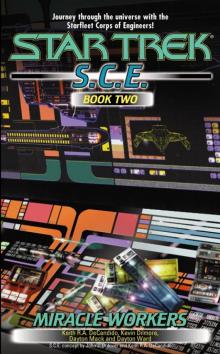 Miracle Workers
Miracle Workers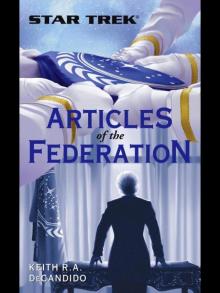 Articles of the Federation
Articles of the Federation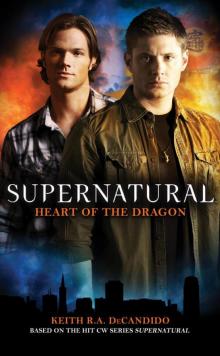 Supernatural Heart of the Dragon
Supernatural Heart of the Dragon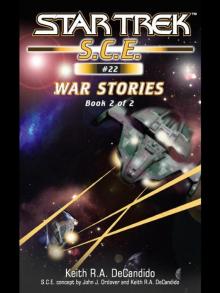 War Stories: Book Two
War Stories: Book Two The Zoo Job
The Zoo Job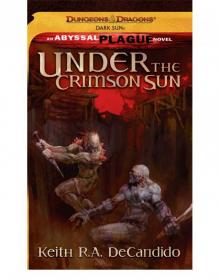 Under the Crimson Sun
Under the Crimson Sun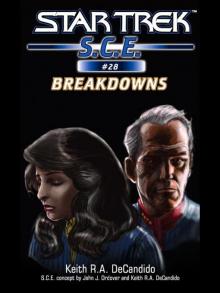 Breakdowns
Breakdowns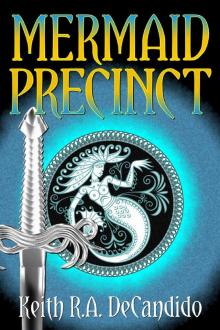 Mermaid Precinct (ARC)
Mermaid Precinct (ARC)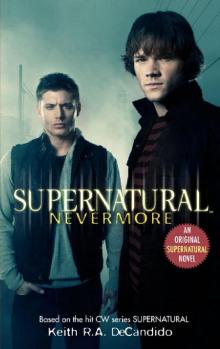 Supernatural 1 - Nevermore
Supernatural 1 - Nevermore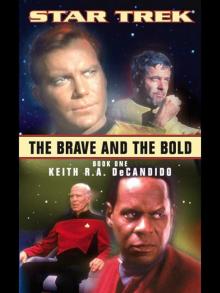 STAR TREK - The Brave and the Bold Book One
STAR TREK - The Brave and the Bold Book One Four Walls
Four Walls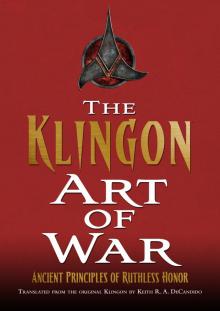 The Klingon Art of War
The Klingon Art of War Blackout
Blackout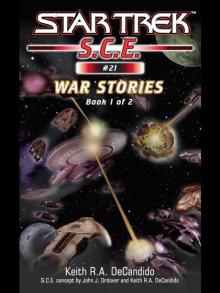 War Stories: Book One
War Stories: Book One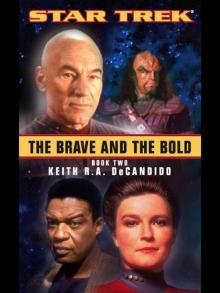 The Brave and the Bold Book Two
The Brave and the Bold Book Two Honor Bound
Honor Bound Sleepy Hollow: Children of the Revolution
Sleepy Hollow: Children of the Revolution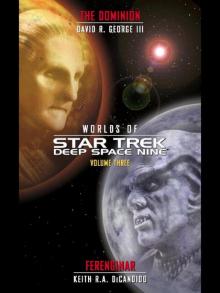 Worlds of Star Trek Deep Space Nine® Volume Three
Worlds of Star Trek Deep Space Nine® Volume Three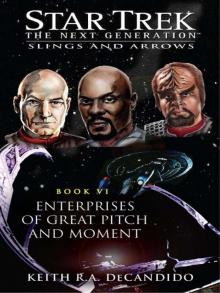 Star Trek: TNG: Enterprises of Great Pitch and Moment
Star Trek: TNG: Enterprises of Great Pitch and Moment Genesis
Genesis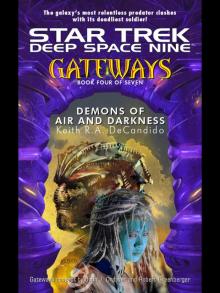 Demons of Air and Darkness
Demons of Air and Darkness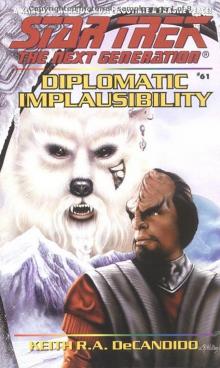 Star Trek - TNG - 61 - Diplomatic Implausibility
Star Trek - TNG - 61 - Diplomatic Implausibility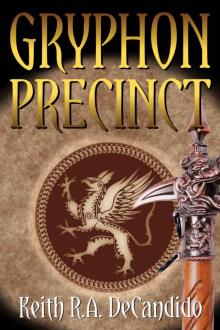 Gryphon Precinct (Dragon Precinct)
Gryphon Precinct (Dragon Precinct)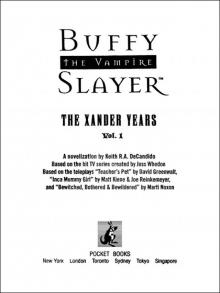 THE XANDER YEARS, Vol. 1
THE XANDER YEARS, Vol. 1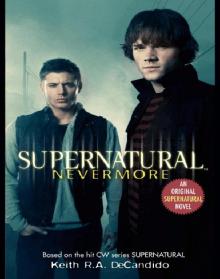 Nevermore
Nevermore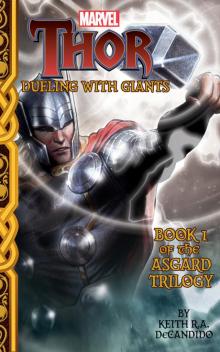 Thor
Thor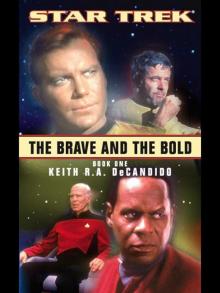 The Brave And The Bold Book One
The Brave And The Bold Book One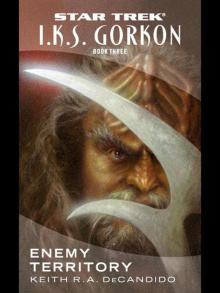 I.K.S. Gorkon Book Three
I.K.S. Gorkon Book Three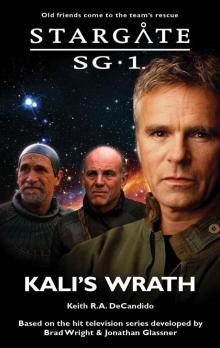 STARGATE SG-1: Kali's Wrath (SG1-28)
STARGATE SG-1: Kali's Wrath (SG1-28)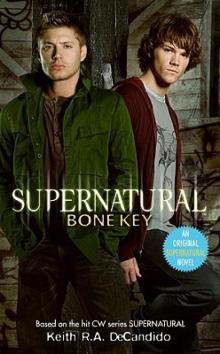 Bone Key
Bone Key Guilt in Innocece
Guilt in Innocece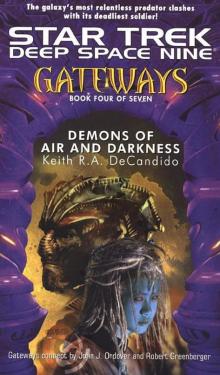 Star Trek - DS9 Relaunch 04 - Gateways - 4 of 7 - Demons Of Air And Darkness
Star Trek - DS9 Relaunch 04 - Gateways - 4 of 7 - Demons Of Air And Darkness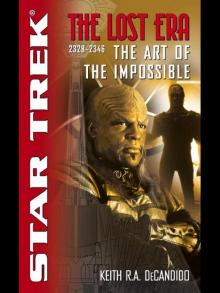 The Art of the Impossible
The Art of the Impossible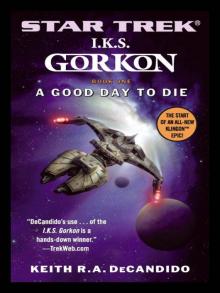 I.K.S. Gorkon Book One: A Good Day to Die
I.K.S. Gorkon Book One: A Good Day to Die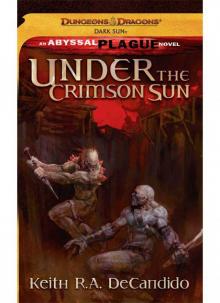 Under the Crimson Sun (the abyssal plague)
Under the Crimson Sun (the abyssal plague)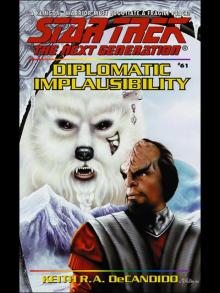 DIPLOMATIC IMPLAUSIBILITY
DIPLOMATIC IMPLAUSIBILITY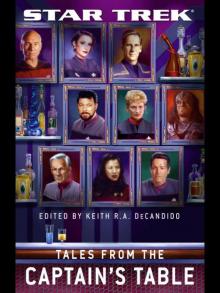 Tales from the Captain's Table
Tales from the Captain's Table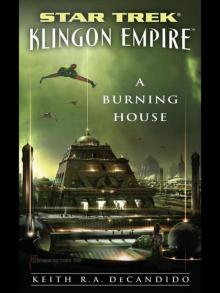 A Burning House
A Burning House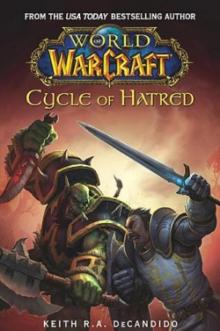 Cycle of Hatred (world of warcraft)
Cycle of Hatred (world of warcraft)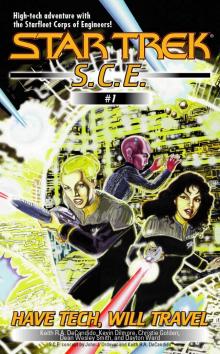 Have Tech, Will Travel
Have Tech, Will Travel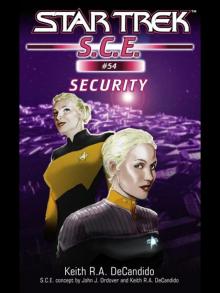 Security
Security